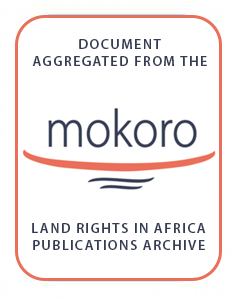Rice research, technological progress, and impacts on the poor
"This case study builds on an ongoing large-scale quantitative research project undertaken by BIDS/IRRI since 1987 originally in 64 unions from 57 districts of the country. It adds a qualitative research component to examine the impact of modern rice varieties (MVs) on livelihoods in a structured sample of eight of these villages across a range of favorable and unfavorable contexts..... The quantitative research shows that for households with access to land there have been direct adoption impacts in the form of increased yields and higher profits.
Double standards: women's property rights violations in Kenya
This report recounts the experiences of 130 women from various regions, ethnic groups, religions, and social classes in Kenya who have had their property rights flouted because they are women.The report presents evidence that women are excluded from inheriting, evicted from their lands and homes by in-laws, stripped of their possessions, and forced to engage in risky sexual practices in order to keep their property. When they divorce or separate from their husbands, they are often expelled from their homes with only their clothing.
Land liberalisation in Africa: inflicting collateral damage on women?
Is the World Bank’s approach to land relations gender insensitive? Is it realistic to pin poverty reduction aspirations on the promotion of credit markets and reliance on women’s unpaid labour? Does the acquisition of secure tenure rights necessarily benefit poor women? How should advocates of women’s rights in Africa respond to the Bank’s land agenda?
Property rights in land reform areas
Land redistribution or the transfer of ownership rights to the tiller has been the focal point of the land reform program in the Philippines. This transfer was envisioned to result in a significant shift in income and productivity in the agrarian sector. While some equalisation of incomes may have indeed occurred, the full benefits of this asset transfer, however, have not been realised.
Rights and reality are women's equal rights to land, housing and property implemented in East Africa ?
Rights and reality are women's equal rights to land, housing and property implemented in East Africa ?
Gender Aspects of Land Reform: Constitutional Principles
A pocket sized booklet published to make a significant contribution towards creating a just, fair and equitable society in which women’s land rights are more strongly recognised and promoted. Contains a series of issues and principles: discrimination on the basis of sex; land tenure reform; land ownership; trust land; rights of inheritance; succession and matrimonial property; land distribution and resettlement schemes; land markets; institutional arrangements; the National Land Policy; conclusion.
Rights and Reality, Are Women's Equal Rights to Land, Housing and Property Implemented in East Africa?
Are women's equal rights to land, housing and property implemented in East Africa? How are land rights translated into national legislation in the Region? This books explores land, housing and property rights in Uganda, Tanzania and Kenya, and looks at how relevant international treaties are transformed into national legislation and policies in these three countries. A detailed analysis of constitutions and laws on land, housing, inheritance, marriage and divorce laws is also offered.
LEAP News: July 2002
Newsletter of a South African research group looking at tenure security issues and legal entities, particularly Common Property Associations (CPAs). Stresses the importance of adapting rather than replacing existing institutions that already work. Provides a list of 20 research papers, conference reports etc which can be ordered by email.
Land Tenure Dynamics and State Intervention: Challenges, Ongoing Experience and Current Debates on Land Tenure in West Africa
Presentation to an international workshop on Making Land Rights More Secure held in Ouagadougou.
Sustaining Forests
This strategy is built on three guiding pillars: harnessing the potential of forests to reduce poverty, integrating forests into sustainable economic development, and protecting global forest values. Recognizing the key role forests play in contributing to the livelihoods of people living in extreme poverty, government and local ownership of forest policies and interventions are emphasized along with the development of appropriate institutions to ensure good governance and the mainstreaming of forests into national development planning.
Land in Africa: an indispenable element towards increasing the wealth of the poor
The poor in Mozambique survive off the land, but what would the consequences be if the land was privatised? This paper looks at how Mozambique is approaching issues surrounding land usage and ownership as market reforms take place and the land becomes increasingly susceptible to being opened up to the market.A historical background to the issue of land use and ownership in Africa is given, from colonisation to the impact of globalisation and the market in present day Africa.






